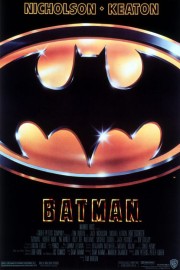Batman
There’s so much to love in Tim Burton’s “Batman.” Jack Nicholson’s Joker is one of the great high-points of the actor’s career playing sociopaths and oddballs. Michael Keaton’s duel role of billionaire playboy Bruce Wayne and masked vigilante Batman doesn’t blend into one another the way Christian Bale and Christopher Nolan have envisioned him in their trilogy, but Keaton– best known for comedic roles –wears the cowl here and in “Batman Returns” with more certainty and pathos than either Val Kilmer or George Clooney did after him. And the strains of Danny Elfman’s score, arguably the most important in the composer’s career, soar to the same musical heights John Williams music did for “Superman: The Movie” eleven years before.
The thing that really becomes clear in watching “Batman” again, even when taking Nolan’s films into account, is that in a way, it’s the closest of any live-action “Batman” film to the sensibility in the comics. Of course, from a narrative standpoint, fanboys certainly have room to groan– I mean really, The Joker kills Wayne’s parents?! –but when it comes to the tone of the film, Burton really does hit all of the right notes. (Same goes for the darker, and superior, “Batman Returns.”)
Nowhere else is this truer than in the way Burton and Nicholson portray The Joker. Rather than the dark, broken agent of chaos Nolan and the late Heath Ledger created in “The Dark Knight,” Burton and Jack hue closer to the Clown Prince of Crime of the comics. Well, certain comics, at least. In particular, the Alan Moore-penned classic, The Killing Joke, stands out. (It does for Ledger’s portrayal as well, but in different ways.) Nicholson’s Joker is over-the-top evil, always giggling as if that’s the only way he can breath, and cracking wise even at the most inopportune times. In the long run, Ledger’s performance is better by virtue of how it mirrors Batman in “The Dark Knight,” but it’s easy to see still how many though Nicholson’s performance was untouchable.
As for the movie itself, while Nolan’s movies trump any that came before it in not just artistic purpose, but narrative fascination, there remains plenty of room to admire Burton’s vision of Batman. True, Kim Basinger’s Vicki Vale doesn’t really hold up to Rachel Dawes in the Nolan movies as a potential love interest; Pat Hingle’s Commissioner Gordon isn’t given the depth Gary Oldman’s Gordon is; and the less said about Robert Wuhl’s reporter Knox, the better, but those are hiccups compared to the flaws that sunk the franchise with “Batman Forever” and “Batman & Robin.” On the whole, Burton succeeds at making a “Batman” that entertains on several levels, whether it’s simply admiring the dark, somewhat twisted production design of Gotham City; Elfman’s circular, circus-like music coupled with a couple of entertaining songs by Prince; watching Michael Gough set a standard only Michael Caine could live up to as Bruce Wayne’s loyal butler, Alfred; or just enjoying watching a master like Nicholson, or an underappreciated pro like Keaton (who, unfortunately, has fallen too far off of Hollywood’s radar over the years, though not far enough to miss out on prime supporting roles in “The Other Guys,” “Jackie Brown,” and “Toy Story 3”), dig into two of the most significant characters in pop culture, and have fun playing with all the wonderful toys Tim Burton gives them. Even more so than “Superman: The Movie,” Burton’s “Batman” gave audiences their first glimpse of what superheroes would look like on-screen, and even now, it’s hard not to get lost in the spectacle Burton created.










